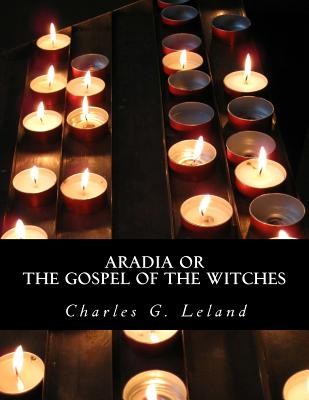
- We will send in 10–14 business days.
- Author: Charles G Leland
- Publisher: CreateSpace Independent Publishing Platform
- Year: 2012
- Pages: 80
- ISBN-10: 1478271884
- ISBN-13: 9781478271888
- Format: 21.6 x 28 x 0.4 cm, minkšti viršeliai
- Language: English
- SAVE -10% with code: EXTRA
Reviews
Description
The text is a composite. Some of it is Leland's translation into English of an original Italian manuscript, the Vangelo (gospel). Leland reported receiving the manuscript from his primary informant on Italian witchcraft beliefs, a woman Leland referred to as "Maddalena" and whom he called his "witch informant" in Italy. The rest of the material comes from Leland's research on Italian folklore and traditions, including other related material from Maddalena. Leland had been informed of the Vangelo's existence in 1886, but it took Maddalena eleven years to provide him with a copy. After translating and editing the material, it took another two years for the book to be published. Its fifteen chapters portray the origins, beliefs, rituals and spells of an Italian pagan witchcraft tradition. The central figure of that religion is the goddess Aradia, who came to Earth to teach the practice of witchcraft to peasants in order for them to oppose their feudal oppressors and the Catholic Church. Leland was born to Charles Leland, a commission merchant, and Charlotte Godfrey August 15, 1824 in Philadelphia, Pennsylvania. Shortly after his birth, Leland's nurse took the child to the family attic and performed a ritual on him involving a Bible, a key, a knife, lighted candles, money and salt to ensure a long life as a "scholar and a wizard", a fact which Leland's biographers have commented upon as foreshadowing his interest in folk traditions and magic. Leland worked in journalism, travelled extensively, and became interested in folklore and folk linguistics, publishing books and articles on American and European languages and folk traditions. By the end of his life shortly after the turn of the century, Leland had worked in a wide variety of trades, achieved recognition as the author of the comic Hans Breitmann's Ballads, fought in two conflicts, and had written what was to become a primary source text for Neopaganism half a century later, Aradia, or the Gospel of the Witches.
- Author: Charles G Leland
- Publisher: CreateSpace Independent Publishing Platform
- Year: 2012
- Pages: 80
- ISBN-10: 1478271884
- ISBN-13: 9781478271888
- Format: 21.6 x 28 x 0.4 cm, minkšti viršeliai
- Language: English English
The text is a composite. Some of it is Leland's translation into English of an original Italian manuscript, the Vangelo (gospel). Leland reported receiving the manuscript from his primary informant on Italian witchcraft beliefs, a woman Leland referred to as "Maddalena" and whom he called his "witch informant" in Italy. The rest of the material comes from Leland's research on Italian folklore and traditions, including other related material from Maddalena. Leland had been informed of the Vangelo's existence in 1886, but it took Maddalena eleven years to provide him with a copy. After translating and editing the material, it took another two years for the book to be published. Its fifteen chapters portray the origins, beliefs, rituals and spells of an Italian pagan witchcraft tradition. The central figure of that religion is the goddess Aradia, who came to Earth to teach the practice of witchcraft to peasants in order for them to oppose their feudal oppressors and the Catholic Church. Leland was born to Charles Leland, a commission merchant, and Charlotte Godfrey August 15, 1824 in Philadelphia, Pennsylvania. Shortly after his birth, Leland's nurse took the child to the family attic and performed a ritual on him involving a Bible, a key, a knife, lighted candles, money and salt to ensure a long life as a "scholar and a wizard", a fact which Leland's biographers have commented upon as foreshadowing his interest in folk traditions and magic. Leland worked in journalism, travelled extensively, and became interested in folklore and folk linguistics, publishing books and articles on American and European languages and folk traditions. By the end of his life shortly after the turn of the century, Leland had worked in a wide variety of trades, achieved recognition as the author of the comic Hans Breitmann's Ballads, fought in two conflicts, and had written what was to become a primary source text for Neopaganism half a century later, Aradia, or the Gospel of the Witches.


Reviews